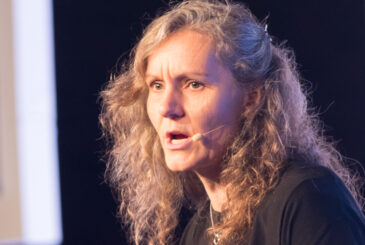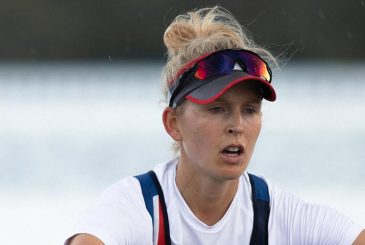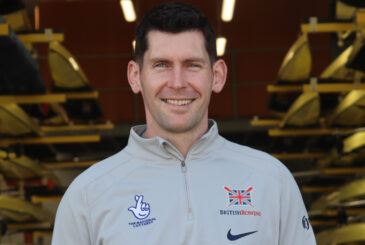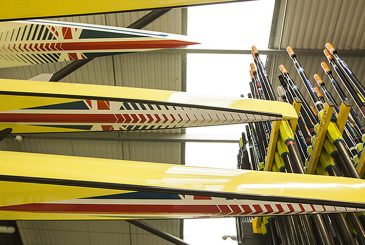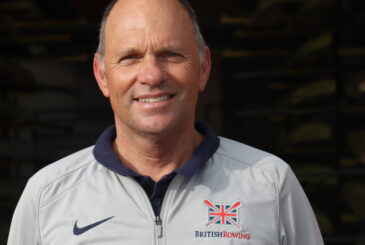As the GB Rowing Team head to the Europeans this week, Martin Cross assesses Britain’s medal chances
After 20 months, without a stroke rowed in anger against international opposition, a full British rowing team will finally take to the water at the 2021 European Rowing Championships, on Lago di Varese.
The standout entry from the British perspective is undoubtedly Helen Glover’s reappearance in the women’s pairs. At 34, the returning double Olympic pairs champion may be the oldest competitor in the event, but the fact that Glover is reunited with Rio silver medallist Polly Swann, with whom she took the world pairs title back in 2013, adds a frisson of excitement to the whole event.
“I’m finding the journey exciting and extremely challenging, but I hope I can return from Varese with some success stories to share with the children,” said Glover, who has three young children.
The British duo will face the top three crews – Romania, Spain and Greece – from last year’s European championships, held in Poznan back in October 2020. Despite the fact that they have only been together for a few weeks, the British will be targeting a podium place, mindful that when the World Championships were last run in in 2019 the first four crews all came from outside Europe.
Needless to say, World Rowing, the Varese organising committee and every team competing have moved heaven and earth to make the event as COVID-secure as possible. It is testament to their efforts that the event is being staged at all when Italy is still in the grip of a third wave. There will be no spectators at the event; masks, sanitising and social distancing will be rigidly enforced. On-site testing so that competitors and coaches can travel back safely will be available. Plans are well advanced for the event to be televised.
This championship will also mark the first major event of the post-Jürgen Grobler era. The British will be looking for proof that they can compete at the highest levels without their talismanic coach. Nowhere is that more so than in the men’s eight – the boat that Grobler wanted to take to Tokyo for a shot at yet another gold medal.
The men’s eights will be fascinating because the Dutch crew have been training with electric motors attached to their boat
Realistically, the British eight, now under the watchful eyes of Steve Trapmore, will be delighted if they are competitive against the German and Dutch eights. These boats took gold and silver respectively ahead of the British in the 2019 World Rowing Championships. With a fast Romanian crew in the mix too, a medal will represent an excellent start to the British Olympic campaign. The men’s eight has just one change from their 2019 line-up with Charlie Elwes coming in for Matt Tarrant.
The men’s eights will be fascinating because the Dutch crew have been training with electric motors attached to their boat. This has enabled them to train at race rates of between 38-40 strokes per minute for periods of up to 20 minutes. It could give the crew from the Netherlands the impetus they need to break Germany’s domination of the event.
The men’s four will face a stellar line-up in their event. The Dutch European champions headline the event, with the same combination that took gold by more than a length ahead of Italy and the reigning world champions from Poland.
Into that mix will come the world silver medallists from Romania. In the 2019 World Championships, it was the Romanians’ fast finish that pushed the British four back into third place. A podium finish will represent an excellent result for the British who will once more be stroked by Sholto Carnegie. Look out for the influence of their new coach Robin Williams on the style of the British boat.
A podium place will be within reach for Vicky Thornley in the women’s single sculls
The lightweight women’s doubles take place in the wake of the shock retirement of the Kiwi world champion Zoe McBride last month. The British double of Emily Craig and Imogen Grant will be looking to take every advantage from that change at the top of the field.
In the 2019 World Championships, the British rowed through the field to take a brilliant bronze ahead of the fast Romanians. It was the Dutch who took silver in that race, less than two seconds ahead of the British. But with more time in the boat, the British will be looking to close the gap on Ilse Paulis and Marieke Keijser, who are also the reigning European champions. The in-form Italians, who took silver in the 2020 Europeans, will test the British double.
A podium place will be within reach for Vicky Thornley in the women’s single sculls. In the absence of Ireland’s world and European champion Sanita Puspure, the field looks wide open. Thornley who sustained an injury after a cycling accident in the first lockdown training is now well recovered. If she shows the form that took her to a fourth place in the 2019 World Championships, the 33-year-old will have a great chance of a gold medal. Standing in her way will be a group of five scullers: Austria’s Magdalena Lobnig, Denmark’s Fie Udby Erichsen, Switzerland’s Jeannine Gmelin and Greece’s Anneta Kyridou.
The British double of John Collins and Graeme Thomas are on form and will target a podium place
One of the most competitive events will be the men’s doubles. The explosive Dutch double of Melvin Twellaar and Stef Broenink won the Europeans by a length ahead of Switzerland and Ireland, with Poland back in fourth. But the British double of John Collins and Graeme Thomas are on form and will target a podium place that just eluded them during the 2019 World Championships.
Their teammates from the new-look men’s quad of Harry Leask, Angus Groom, Tom Barras and Jack Beaumont are also in a highly competitive event. The peerless Dutch crew – world and European champions – look untouchable and the Italians will be hard to beat. In this company, the British will look to ensure the A final berth that eluded them in the 2019 World Championships.
The women’s four of Rowan McKellar, Harriet Taylor, Karen Bennett and Rebecca Shorten last rowed in the eight at the 2019 World Championships, which finished in fifth place. Now reshuffled into this new combination, the British will come up against another very fast Dutch combination, who should win gold. Denmark, Ireland and Italy have won medals either at the Europeans or World Championships, so a podium place for the British boat would be a great result.
Both the women’s eight and quad are new combinations. The quad will be anchored by the Hodgkins-Byrne sisters: Mathilda and Charlotte. Under-23 medallists Hannah Scott and Lucy Glover will join them.
Britain’s Paralympic crews have excellent chances of winning gold medals
The quad will face the top three crews from last year’s European Championships: the Netherlands, Germany and Poland, so a podium place for the British will be a stunning achievement. Much the same could be said for the women’s eight. With only stroke and cox – Fiona Gammond and Matilda Horn – from the 2019 crew that finished fifth in the World Championships. Their toughest opposition will come from Romania, Germany and the Netherlands, all of whom won medals in the 2020 European Championships.
Britain’s Paralympic crews have excellent chances of winning gold medals. The PR2 mixed double scull of Lauren Rowles and Laurence Whiteley will renew their rivalry with the Dutch and French doubles who took silver and bronze respectively behind them at the 2019 World Championships.
The PR3 mixed coxed four, stroked by Oli Stanhope, won their world title in style in 2019 and will expect to dominate their field once more. Ben Pritchard in the PR1 men’s singles looks to be in an excellent place to make the podium behind Roman Polianskyi, from Ukraine, the favourite for gold.
Photo: Nick Hartland



